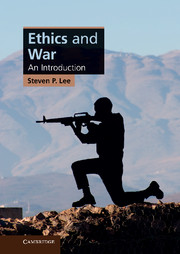Book contents
- Frontmatter
- Contents
- Figures and tables
- Preface
- 1 Understanding war in moral terms
- 2 The just war tradition: a brief history
- 3 When is it just to go to war?
- 4 Sovereignty and human rights
- 5 How should war be fought? Part one
- 6 How should war be fought? Part two
- 7 Civil wars
- 8 Justice at the end of war
- Bibliography
- Index
- References
7 - Civil wars
Published online by Cambridge University Press: 05 June 2012
- Frontmatter
- Contents
- Figures and tables
- Preface
- 1 Understanding war in moral terms
- 2 The just war tradition: a brief history
- 3 When is it just to go to war?
- 4 Sovereignty and human rights
- 5 How should war be fought? Part one
- 6 How should war be fought? Part two
- 7 Civil wars
- 8 Justice at the end of war
- Bibliography
- Index
- References
Summary
A civil war breaks the bands of society … [and] produces in the nation two independent parties [which stand] in precisely the same predicament as two nations … This being the case, it is very evident that the common laws of war … ought to be observed by both parties in every civil war.
Emer de VattelUS Colonel Harry Summers: “You know, you never defeated us on the battlefield.”
Vietnamese Colonel Tu: “That may be so, but it is also irrelevant.”
Conversation in Hanoi about the Vietnam War, 1975For the asymmetrically powerful to insist on the maintenance of the combatant/noncombatant distinction has the appearance of self-serving moralizing.
Paul KahnWhether we bring our enemies to justice, or bring justice to our enemies, justice will be done.
President George W. BushMost of the armed conflicts occurring in the past sixty years have been within states, and most of the deaths in war, especially of civilians, have occurred in those conflicts. From 1945 to 1999, there were roughly five times as many armed conflicts within states, and five times as many people killed in those conflicts, as there were international armed conflicts and resulting deaths. Armed conflicts within states are referred to in International Law as “armed conflicts not of an international character.” We will refer to them as armed civil conflicts, and to each side’s involvement in such conflicts as civil wars. For example, the American Civil War was in our terms an armed civil conflict in which the Union and the Confederacy each fought a civil war against the other. The term civil war is often used to refer to what I call armed civil conflicts, but consistent with the commitment to keep this distinction clear, I will use the term civil war to refer to each side’s involvement rather than to the larger armed conflict. Armed civil conflicts often have an international component because other states intervene in support of one or another side, but the principal focus of these conflicts is internal, involving primarily a struggle between different groups within a state. There are many kinds of civil wars, including secessionist wars, tribal and ethnic struggles, proxy and client wars, efforts at ethnic cleansing and genocide, guerrilla war, anti-colonial and anti-occupation struggles, wars of national liberation, bloody coups, revolutions, and resource wars.
Armed civil conflicts have continued to be the dominant form of warfare following the end of the Cold War in 1991, though their character has changed. Prior to the 1990s, the Cold War between the United States and the Soviet Union influenced and shaped the politics and conflicts within many states in what was then called the Third World. With the decline of that influence, ethnic and other tensions within states have come to the fore to shape internal conflicts. These conflicts have been referred to as new wars, and what characterizes many of them, as British philosopher Paul Gilbert notes, is that they are “a continuation of the politics of identity.” Many of the wars are fought in the name of ethnic identity, and they “arise in communal or sectarian violence between small numbers of people from opposed identity groups.” The state then may get involved on one side or the other, often as demagogues seek political advantage from championing an ethnic cause. As Gilbert notes, the principle of civilian immunity is often ignored in such conflicts because the opposing ethnic group becomes defined as the enemy. This feature of armed conflicts in our era has led to genocides, episodes of ethnic cleansing, and the need for humanitarian interventions.
- Type
- Chapter
- Information
- Ethics and WarAn Introduction, pp. 240 - 275Publisher: Cambridge University PressPrint publication year: 2011



